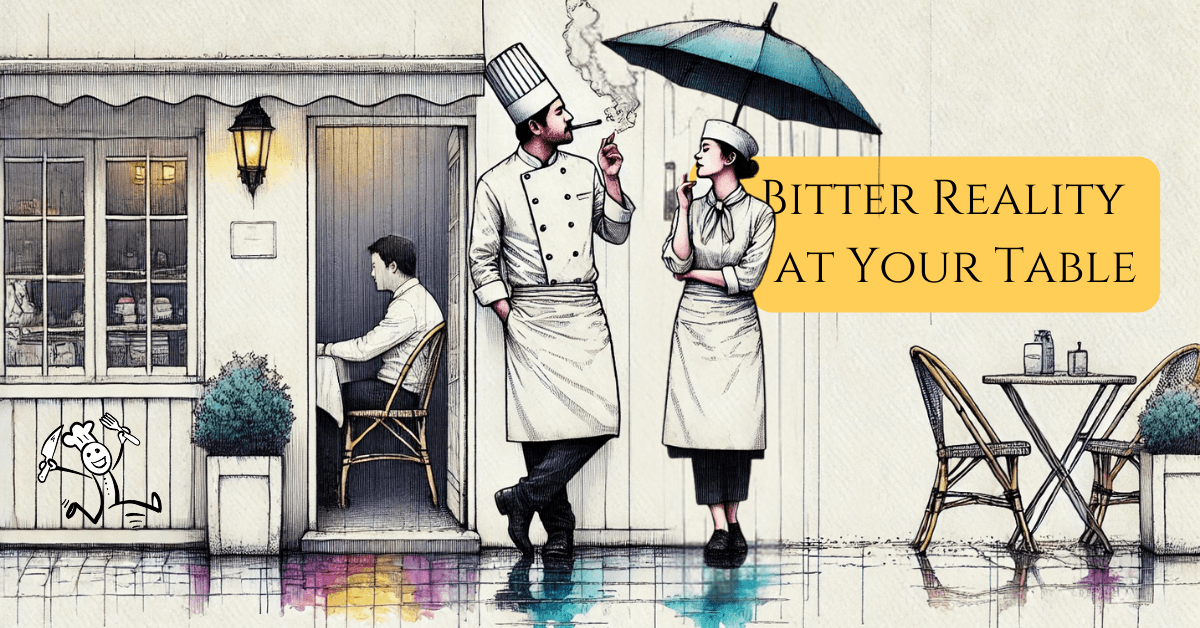The viral trend of empty restaurants that took over your feed this Janurary feels like a mask hiding darker truths of life working in a restaurant. January 2025 has been a tough one for all of us, here in Paris the rising cost of living bites worse than the freezing temperatures. Scary things happened in such a short time, this afternoon I stuck on my favourite Radiohead album and wrote something about the poverty I see around me every day.
Even in the best restaurants, behind the polished counters and plated perfection lies a bitter truth – most people working in the restaurant industry are poor. A poverty not just found in wages but in the very skills that define the craft. It’s a world I’ve lived, observed, and at times, been broken by. But it’s also a world I love enough to want to be part of.
Cooking saves me on the darkest of days. Giving you great hospitality is the fire that fuels my kitchen.
Table of Contents
The Wage Poverty that’s never discussed
A few weeks before the end of 2024 that I realised that I was still getting paid the same as when I was a chef 20 years ago. But trust me everything else is more expensive. Making ends meet is getting harder both front and back of house. The stories I’ve heard from full time staff from top hotel schools not even making it a week after pay day before there back in the red. Have we romanticised life in the restaurant too much?
There’s nothing romantic about the paycheck that barely pays rent. Many chefs and restaurant workers endure long hours and grueling conditions, often in exchange for wages that border on insult. We’ve normalized the hustle – “if you don’t like it, get out” – but at what cost? Turnover rates climb, burnout becomes the norm, and the industry’s backbone bends further under pressure.
Sure getting a restaurant job is not the same as being a doctor. I, like Chef Gustau, believe that anyone can cook but does that mean we should be treated this way? As a humanist capitalist, I fundamentally believe that we should do business and make profit in such a way that takes care of the environment and the humans we work with.
With some reflection I understand that the human scale food businesses are suffering the most. Those of us that just want to serve local produce to our local community battle with the megacorps like MacDonalds, LVMH or even Ducasse. Today profit hungry pigs rule the roost. Scales of economy and employment power means they have somehow gotten away with paying people the least amount possible. Our human scale businesses are dying and with it the dream of running a local spot, serving local veg to our locals.
The Skills Poverty Bites just as hard
Now, let’s talk about another type of poverty – the skills gap. It’s a quieter crisis, one that sneaks up on you. With fewer apprenticeships and proper training opportunities, many new entrants to the industry lack the foundational techniques that once defined the trade. This isn’t their fault; it’s ours. The cycle perpetuates when experienced chefs, crushed by their own workloads, can’t or won’t invest time in teaching.
Some how it’s the Instagram influencers and rich kids that run the restaurants, as their drop out jobs with about as much knowledge of how to do it as gastronomy at your local KFC.
I remember an especially tough day in my own kitchen last year. It was service, and we were running behind. A young commis chef was struggling to keep up, and I stepped in to help. It wasn’t frustration I felt when I saw his blank expression; it was guilt. He’d never been shown how. He hadn’t had the chance to learn the basics, and I realized how easy it is to let the chain of mentorship break under the weight of the daily grind.
The memes of owners stepping in during the rush rule the roost on hospitalities social media.
It’s not just the young ones, either. I’ve worked alongside seasoned chefs who’ve lost their spark, restaurant owners who don’t know how to manage budgets or propel their business forward.
When the fire goes out, we all lose something – the craft, the creativity, the future of the industry. The experience you get when you spend your hard earned money on moment of luxury.
The Need for Balance
For those of us who stay in hospitality long-term, it’s not because we’re masochists. It’s because we love it. We thrive on the chaos, the creativity, the camaraderie. But if we want this industry to survive, we – the chefs, owners, and decision-makers – need to nurture those around us.
I think about a former mentor of mine, a head chef who seemed to carry the weight of the world on his shoulders. He ran a tight ship but always made time to teach. “If you want to cook for a lifetime,” he told me once, “you have to give as much as you take.” That advice stuck with me. And now, when I see young cooks struggling, I hear his voice reminding me that mentorship is just as important as the perfect plate.
Getting Attention in 2025
The reality is this: in 2025, survival in hospitality requires more than just great food. You need to capture attention. Not in a gimmicky, TikTok-viral way (although hey, if it works…). It’s about cultivating a reputation as a chef or a restaurant that genuinely cares – for your craft, your people, your diners. The industry is watching, and diners are more discerning than ever. Show them your values, and they’ll reward you with their loyalty.
This is what sets great chefs and restaurants apart. It’s not just the Michelin stars or Instagram-perfect dishes; it’s the heart you put into every element of the business.
The Route Out
As someone who recently lost yet another cheffing job I have had a few minutes to think about all this.
The way out of poverty – both wages and skills – is through collective action and personal responsibility. Mentor the next generation. Fight for fairer wages, and demand more from the restaurants you dine in. If you’re in the industry, make 2025 the year you find balance – between passion and practicality, teaching and learning, surviving and thriving.
I’ve seen what happens when chefs nurture their teams – when they invest in skills, support fair pay, and take the time to build something sustainable. I’ve also seen what happens when they don’t. The difference is stark.
It’s not an easy path, but it’s one worth taking. Because when we lift each other up, we lift the industry as a whole. And maybe, just maybe, we can turn this story from one of poverty to one of prosperity – for everyone in hospitality.
Love this? Get more real, unfiltered food stories straight to your inbox. No fluff, no spam—just damn good food writing and all for free!

From the bustling streets of Paris to the heat of a professional kitchen, my life has always revolved around food. A Brit who moved to France at 16, I trained as a chef in a Parisian palace kitchen at 18 and have spent decades cooking, eating, and living like the French.
By day, I run kitchens and events, but Eat Like The French is my side hustle—a way to share my passion for French food through writing and food tours. After a detour into tech recruitment, I returned to what I love most: cooking and storytelling—one dish, one tour, and one bite at a time.


1 thought on “Poverty in Restaurants – A Bitter Reality at Your Table”